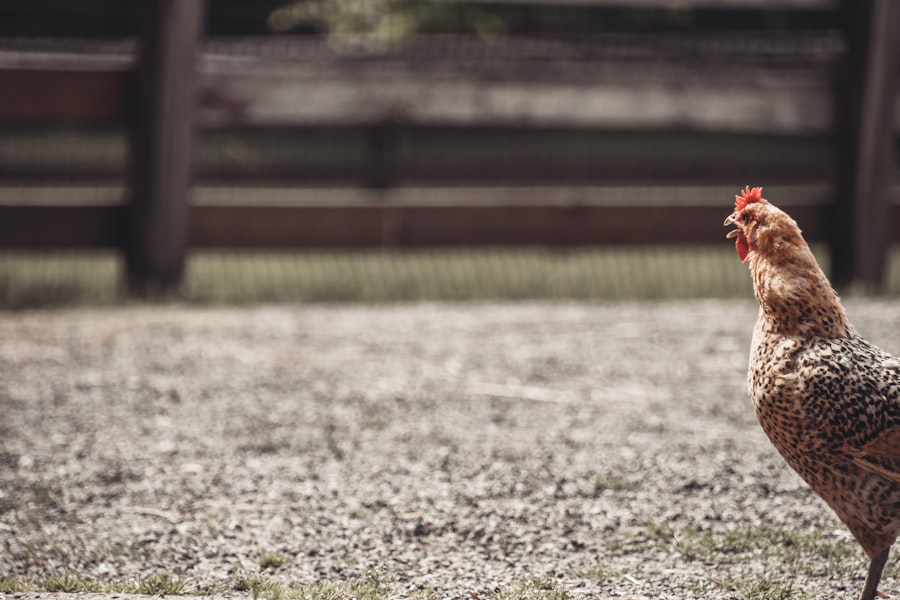Tapeworm infestation is a prevalent issue affecting chickens, particularly in free-range and backyard flocks. These parasitic flatworms can cause various health problems in chickens, including weight loss, reduced egg production, and potential fatality in severe cases. Tapeworms also present a risk to human health if infected poultry is consumed.
The primary mode of transmission is through the ingestion of infected intermediate hosts, such as earthworms, beetles, or other insects. Once inside the chicken’s digestive system, tapeworms can proliferate, leading to significant infestations if left untreated. Detecting tapeworm infestations in chickens can be challenging due to subtle and easily overlooked symptoms.
Common indicators include weight loss, decreased appetite, diarrhea, and a dull, unkempt appearance. Affected chickens may also display signs of discomfort, such as excessive scratching or pecking at their vent area. Chicken owners must remain vigilant in monitoring their flock for signs of tapeworm infestation and implement appropriate preventive and treatment measures to address this parasitic issue.
Table of Contents
- 1 The Role of Apple Cider Vinegar in Chicken Health
- 2 Factors Contributing to Tapeworm Infestation in Chickens
- 3 Limitations of Apple Cider Vinegar in Preventing Tapeworm in Chickens
- 4 Alternative Methods for Tapeworm Prevention in Chickens
- 5 Seeking Veterinary Assistance for Tapeworm Infestation
- 6 Implementing Good Hygiene Practices in Chicken Coops
- 7 FAQs
Key Takeaways
- Tapeworm infestation in chickens can lead to poor health and decreased egg production
- Apple cider vinegar can help improve chicken health by promoting a balanced pH level in their digestive system
- Factors such as poor sanitation, contaminated feed, and exposure to infected rodents can contribute to tapeworm infestation in chickens
- While apple cider vinegar can support chicken health, it may not be effective as the sole method for preventing tapeworm infestation
- Alternative methods for tapeworm prevention in chickens include regular deworming, using natural herbs, and maintaining a clean and hygienic coop environment
- Veterinary assistance is crucial for diagnosing and treating tapeworm infestation in chickens
- Good hygiene practices in chicken coops, such as regular cleaning, proper waste disposal, and rodent control, are essential for preventing tapeworm infestation
The Role of Apple Cider Vinegar in Chicken Health
How Apple Cider Vinegar Works
The acidic nature of apple cider vinegar is believed to create an unfavorable environment for parasites in the chicken’s digestive system, helping to maintain a healthy pH balance in the gut and making it less hospitable for parasites like tapeworms to thrive.
Incorporating Apple Cider Vinegar into a Chicken’s Diet
Apple cider vinegar can be added to a chicken’s diet by mixing a small amount with their drinking water or feed. It is essential to use raw, unfiltered apple cider vinegar that contains the “mother,” as this form is believed to have the most beneficial properties for chicken health.
A Holistic Approach to Tapeworm Prevention
While apple cider vinegar may play a role in supporting overall chicken health and potentially reducing the risk of tapeworm infestation, it is crucial to note that it should not be relied upon as the sole method of prevention. A holistic approach that includes good husbandry practices and regular monitoring for signs of infestation is essential for maintaining the health of a chicken flock.
Factors Contributing to Tapeworm Infestation in Chickens

Several factors can contribute to tapeworm infestation in chickens, making it important for chicken owners to be aware of potential risk factors and take proactive measures to prevent infestations. One common factor is the presence of intermediate hosts in the chicken’s environment. Chickens that have access to outdoor areas where earthworms, beetles, or other insects are abundant are at a higher risk of ingesting tapeworm larvae.
Additionally, poor sanitation and hygiene practices in the chicken coop can create an environment conducive to parasite transmission. Overcrowding, inadequate ventilation, and damp or dirty bedding can all contribute to an increased risk of tapeworm infestation. Furthermore, the introduction of new birds into an existing flock can also pose a risk for tapeworm transmission, as new arrivals may bring parasites with them.
It is important for chicken owners to quarantine new birds and monitor them for signs of infestation before introducing them to the rest of the flock. Additionally, poor nutrition and stress can weaken a chicken’s immune system, making them more susceptible to parasitic infestations. By addressing these contributing factors and implementing preventative measures, such as regular deworming and good hygiene practices, chicken owners can help reduce the risk of tapeworm infestation in their flocks.
Limitations of Apple Cider Vinegar in Preventing Tapeworm in Chickens
While apple cider vinegar may offer some benefits for chicken health and potentially contribute to parasite prevention, it is important to recognize its limitations in addressing tapeworm infestation in chickens. Apple cider vinegar should not be relied upon as the sole method of tapeworm prevention, as its effectiveness in eradicating tapeworms from the digestive system is not well-documented. While the acidic nature of apple cider vinegar may create an unfavorable environment for parasites, it may not be sufficient to eliminate an existing tapeworm infestation.
Additionally, the dosage and administration of apple cider vinegar for tapeworm prevention may vary among individual chickens, making it challenging to ensure consistent and effective treatment. Furthermore, some chickens may be resistant to the taste of apple cider vinegar when added to their drinking water or feed, leading to inconsistent consumption and potential ineffectiveness. It is important for chicken owners to approach tapeworm prevention holistically, incorporating multiple strategies such as good hygiene practices, regular deworming, and proper nutrition, rather than relying solely on apple cider vinegar.
Alternative Methods for Tapeworm Prevention in Chickens
In addition to apple cider vinegar, there are several alternative methods that can be used to prevent tapeworm infestation in chickens. Regular deworming with veterinary-approved medications is an important preventative measure that can help control internal parasites, including tapeworms. These medications are available in various forms, including oral drenches and medicated feed additives, and should be administered according to veterinary recommendations.
Good hygiene practices in the chicken coop are also essential for preventing tapeworm infestations. This includes regular cleaning and disinfection of the coop and nesting boxes, as well as proper waste management to reduce the presence of intermediate hosts such as earthworms and insects. Providing a clean and dry environment for chickens can help minimize the risk of parasite transmission.
Furthermore, maintaining a balanced and nutritious diet for chickens can support their overall health and immune function, reducing their susceptibility to parasitic infestations. This includes providing access to fresh water, high-quality feed, and supplemental nutrients as needed. By incorporating these alternative methods alongside apple cider vinegar supplementation, chicken owners can take a comprehensive approach to tapeworm prevention and ensure the health and well-being of their flock.
Seeking Veterinary Assistance for Tapeworm Infestation

Diagnosis and Treatment
When tapeworm infestation is suspected or confirmed in a chicken flock, it is crucial to seek veterinary assistance for proper diagnosis and treatment. A veterinarian can conduct fecal testing to identify the presence of tapeworm eggs or segments in the chicken’s droppings, confirming the diagnosis of infestation. Based on the severity of the infestation and the specific needs of the flock, a veterinarian can recommend appropriate deworming medications and treatment protocols.
Importance of Following Veterinary Recommendations
It is essential for chicken owners to follow veterinary recommendations closely when treating tapeworm infestations. Improper use of medications can lead to resistance and ineffective treatment. By adhering to the veterinarian’s guidance, chicken owners can ensure the most effective treatment outcome for their flock.
Preventative Measures and Ongoing Support
Veterinarians can provide valuable guidance on preventative measures and management practices to reduce the risk of future infestations in the flock. By working with a veterinarian, chicken owners can receive expert support in addressing tapeworm infestations and ensuring the overall health and welfare of their flock.
Implementing Good Hygiene Practices in Chicken Coops
Good hygiene practices are essential for maintaining a clean and healthy environment for chickens and reducing the risk of tapeworm infestation. Regular cleaning and disinfection of the chicken coop and nesting boxes are important for minimizing the presence of parasites and their intermediate hosts. This includes removing soiled bedding, feces, and debris from the coop on a regular basis and replacing it with clean bedding material.
Proper waste management is also crucial for preventing tapeworm infestations in chickens. This includes disposing of waste material away from areas where chickens have access and minimizing contact with potential intermediate hosts such as earthworms and insects. By managing waste effectively and keeping the coop clean and dry, chicken owners can create an environment that is less hospitable to parasites.
Furthermore, maintaining good ventilation in the chicken coop can help reduce moisture levels and prevent the buildup of bacteria and parasites. Adequate airflow can also help minimize odors and ammonia levels, creating a healthier environment for chickens. By implementing these good hygiene practices consistently, chicken owners can help reduce the risk of tapeworm infestations and promote the overall health and well-being of their flock.
In conclusion, tapeworm infestation is a common problem in chickens that can have significant impacts on their health and productivity. Understanding the factors contributing to tapeworm infestations and implementing preventative measures such as good hygiene practices, regular deworming, and proper nutrition are essential for maintaining a healthy flock. While apple cider vinegar may offer some benefits for chicken health and potentially contribute to parasite prevention, it should not be relied upon as the sole method of tapeworm prevention.
By taking a holistic approach that incorporates multiple strategies and seeking veterinary assistance when needed, chicken owners can effectively manage tapeworm infestations and ensure the well-being of their flock.
If you’re struggling with chickens keep getting tapeworm and finding that ACV is not preventing it, you may want to consider the impact of their diet. According to a related article on Poultry Wizard, geese can actually eat chicken feed. This could potentially lead to cross-contamination and the spread of parasites, including tapeworm. It’s important to carefully monitor the feeding habits of all poultry on your farm to prevent the spread of diseases and parasites. Learn more about the impact of geese eating chicken feed here.
FAQs
What are tapeworms and how do chickens get them?
Tapeworms are parasitic flatworms that can infect chickens when they consume infected intermediate hosts such as earthworms, beetles, or other insects. Once ingested, tapeworms can grow and multiply within the chicken’s digestive system, leading to health issues.
How does apple cider vinegar (ACV) work in preventing tapeworms in chickens?
Apple cider vinegar is believed to create an acidic environment in the chicken’s digestive system, which is thought to be inhospitable to parasites like tapeworms. It is also believed to have some antimicrobial properties that may help in preventing parasitic infections.
Why might chickens still get tapeworms despite being given apple cider vinegar?
While apple cider vinegar may have some benefits for chicken health, it is not a guaranteed method for preventing tapeworm infections. Other factors such as the overall health of the chickens, their living conditions, and the presence of intermediate hosts in their environment can also contribute to tapeworm infestations.
What are some other methods for preventing tapeworm infections in chickens?
Maintaining good hygiene in the chicken coop, regularly deworming chickens with appropriate medications, and minimizing their exposure to potential intermediate hosts can all help in preventing tapeworm infections. It’s important to consult with a veterinarian for the best approach to parasite prevention in chickens.
Meet Walter, the feathered-friend fanatic of Florida! Nestled in the sunshine state, Walter struts through life with his feathered companions, clucking his way to happiness. With a coop that’s fancier than a five-star hotel, he’s the Don Juan of the chicken world. When he’s not teaching his hens to do the cha-cha, you’ll find him in a heated debate with his prized rooster, Sir Clucks-a-Lot. Walter’s poultry passion is no yolk; he’s the sunny-side-up guy you never knew you needed in your flock of friends!







